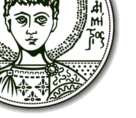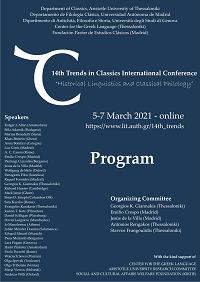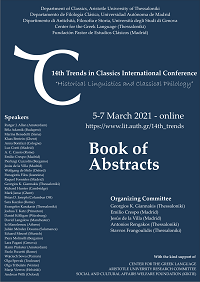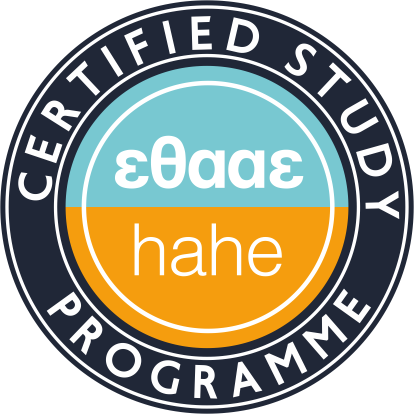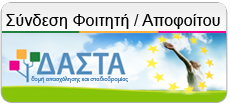14th Trends in Classics International Conference
Department of Classics, Aristotle University of Thessaloniki
Departamento de Filología Clásica, Universidad Autónoma de Madrid
Dipartimento di Antichità, Filosofia e Storia, Università degli Studi di Genova|
Center for the Greek Language (Thessaloniki)
Fundación Pastor de Estudios Clásicos (Madrid)
14th Trends in Classics International online Conference
“Historical Linguistics and Classical Philology”
Thessaloniki, 5-7 March 2021
In case you need help during the days of the Conference please contact
Tasos Paschalis (pasxalis@enl.auth.gr) or Georgios K. Giannakis (ggianak@lit.auth.gr)
Organizing Committee:
Georgios K. Giannakis, Aristotle University of Thessaloniki
Emilio Crespo, Universidad Autónoma de Madrid/Fundación Pastor
Jesús de la Villa, Universidad Autónoma de Madrid
Stavros Frangoulidis, Aristotle University of Thessaloniki
Antonios Rengakos, Aristotle University of Thessaloniki/Academy of Athens
For further information, you may contact Georgios K. Giannakis at ggianak@lit.auth.gr
Note on Program:
Please bear in mind that all times are in local Greek Time Zone.
Technical Details:
1. 14th Trends in Classics will be based on the ZOOM platform.
2. The videoconference link will be sent by email a few days before the conference.
3. In order to have an easy and trouble-free participation please ensure that you have:
a. a computer with a stable internet connection
b. a headset (preferable) or external speaker/microphone
c. a web camera
4. If you’ve never used Zoom before please click here, download and install Zoom Client for Meetings.
5. You can test your internet connection, microphone, speakers and camera by joining a test meeting available here.
Speakers & Titles:
Click here for the list of conference speakers and titles.
Conference description:
It has been argued that historical linguistics is the child of classical philology, yet the borders of the two disciplines have not always been so clearly defined or delineated, while their history testifies to a turbulent coexistence, sometimes demonstrating a cross-fertilizing collaboration and at other times taking centrifugal paths, but always moving along a ‘love-and-hate’ course. This kind of relation is best reflected in the 19th-century shift in the pronouncements by two of the most prominent protagonists of this association, Georg Curtius and Karl Brugmann, teacher and student respectively, with the symbolic reversal of the order of the two disciplines in the respective titles from “Philologie und Sprachwissenschaft” (1862) to “Sprachwissenschaft und Philologie” (1885).
The debate is long-standing and well alive today. The conference revisits this relation aspiring to address its various aspects and ramifications, investigate the wide range of applications of the linguistic method in the philological analysis of classical texts, as well as explore new venues of the contacts between the two disciplines and try to further this collaboration into areas mutually beneficial to both fields. In this spirit, the participants are asked to contribute studies showing new results that can be reached and that open new perspectives in the present-day research using the tools and methods of historical linguistics applied to the temporal span, the geographical area and the languages that are of interest to today’s classical philology understood in a broad sense as the knowledge of classical antiquity.
Sponsored by:

